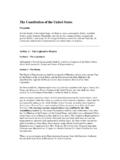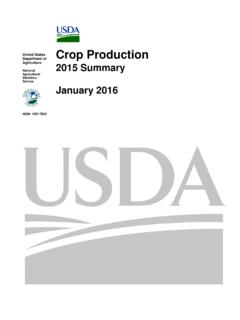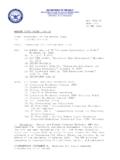Transcription of Department of United States Sample Policies …
1 United StatesDepartment ofAgricultureSample PoliciesAgricultural$~Vy~ativefor CooperativesCooperativeInformationReport 39 Policies for CooperativesCompiled by Galen RappCooperative Information Report 39 May 1990 Reviewed and approved for reprinting May overall objective of this publication is to providedirectors and managers of farmer cooperatives with guide-lines for writing, adopting, and implementing broad classes of Policies are presented-board, man-agement, and reflect the philosophy of the cooperativewhether they are orally implied because we have alwaysdone it that way or a formal set of Policies researched,skillfully written, adopted by board action, and communi-cated to all who are to work within their policy is important to all cooperatives.
2 Ascooperatives mature and longtime directors and employeesretire, many oral and implied Policies are in the process of organizing or emerging willfind a set of written Policies a guideline for making routineand recurring decisions. In both cases, Policies help coop-eratives attain established goals and objectivesContentsWhy WritePolicy?..lPolicy Writing for Writing, Implementingand Evaluating and Manager Policy Review and s Duty to Follow Legal Meeting Meeting Supervision of s Use of Outside of to Training and s Role in Board of Common Shares of of Performance of of of Periods and Pay or Replacement of.
3 ,..,..,..,..17 WageandSalary Plan Adjustment.. 17 Public Relations..17 Community Activities..17 Conflicts of Interest..18 Political Activity..18 Finances..18 Accounts Payable..18 Annual Financial Audit..18 Annual Operating ,..19 Borrowing Policy..19 Credit Policy,,,,..,.,,..,,,,,..20 Handling Delinquent Accounts..21 Director Per Diem, Mileage, and TravelExpense..*..,..21 Donations..22 Employee Credit..22 Employee Travel and EntertainmentAllowance,,,..,..,..,.,.,.. 22 Expenditures for Facilities, Machinery,and Equipment..23 Expenditures for Supplies and Services.. 23 Expressions of ,..*..*..24 Redemption of Equities.. 24 Travel Expense..25 Sales/Marketing/Productions,,,,..26 Grain Marketing and Hedging ..,,..,.,,,,.. ,..,..,,,,,,..27 Marketing.
4 ,,.,..,,,,,,,..27 Merchandise To Be Handled..*.*..28 Producer Payments.,,,,,,,,..*..,,,..*.. 28 Purchasing Policy ..,,,,,,,,..,,,.. 28 Operation of Association Vehicles ,,,,,,,,..,.. 28 Reporting Injuries and Property Damage..29 Safety..29 Employee ,..30 Application Requirements..30 Attendance and Punctuality,,.,,,,.. 2 Employee 3 Group of Cause for Termination of 5 Maternity 6 Persons Eligible for Former 8 Retirement of New sCompensation of Directors-General of Objectives of the Objectives of the Policies for CooperativesGalen RappACS Cooperative Education SpecialistPolicy Defined-A policy is Q statement that providesguidelines for actions to attain the established objectivesof the cooperative and reflect the cooperative s basic Write Policy?
5 Policies give direction to plans. They are a road mapmanagement can follow to reach goals and attain objec-tives. Well written policy facilitates delegation of authorityto the lowest feasible level in the cooperative. Written poli-cy statements must be a major ingredient of each coopera-tive s planning activity. These Policies should reflect thecooperative s basic philosophy and serve as guidelines foractions the cooperative takes to attain its established determining policy, objectives must be should be clearly stated in writing so that poli-cies can be consistent. A cooperative might declare itself ina written objective to be a nonprofit, member-owned, andmember-controlled enterprise established to provide mar-keting services and products to improve the economic con-dition of its members.
6 Policymaking becomes the meansfor achieving this ResponsibilityIt is the duty and responsibility of the board to origi-nate and approve broad and general policy. The directorsshould approve specific operating Policies recommendedby management. In a developing cooperative, the directorsmay have the responsibility to all make policy decisionsthat affect the well-being of the cooperative. The section, How to Use Sample Policy Handbook, details policywrit-ing CharacteristicsPolicies can be broad and general or detailed and spe-cific. Broad Policies leave room for interpretations and theexercise of judgment and initiative. Specific policiesrequire predetermined should deal with a recognized need.
7 It is theresult of careful thought and research; deals with practicaland specific matters: does not conflict with other coopera-tive Policies : deals with recurring situations: clearly indi-cates the conditions, to whom, and to what extent itapplies; specifies who is responsible for applying it; andmust be concise, legal, and not in conflict with the cooper-ative s articles of incorporation and are not all of equal importance. Some policiesare of such significance they determine the character of thebusiness. Others are limited in scope and could be changedor eliminated without the significance of these two Policies . Onestates a producer will be guaranteed the sale of all productsdelivered regardless of quantity or quality while anotherpermits a Is-minute coffee break for all employees in boththe morning and afternoon.
8 The coffee break is importantto employees, but if eliminated would not affect the goalsand objectives of the cooperative. Determining whether acooperative will guarantee sale of members products ormerely making every effort to move all products, or onlyhandle products of certain sizes or quality, affects the verycharacter of the fundamental policy, such as a requirement toreturn margins to members on a patronage basis will usual-ly be placed in a cooperative s bylaws. However, separatewritten Policies adopted by the board and placed in a poli-cy handbook, are more appropriate than a bylaw for han-dling most issues. Board Policies require less formality foradoption. They can be changed easier if unanticipatedproblems occur.
9 This avoids long, complicated bylaws thatmix essential rules critical to a cooperative s success withsimply desirable business covers broad or basic area of operations and are2generally long-term commitments established by the implement policy. They cover routine pro-cesses established by operations supervisors based onpolicy and may be changed on short notice. Policymakinggroups must resist making detailed rules or writing of Writing PolicyEvery business, new or old, large or small, has poli-cies. Present policy may be written or oral. Some policiesare mandatory based on State and Federal statutes. Othersdefine and clarify the articles of incorporation, bylaws, oraccepted contractual agreements (membership documents,marketing contracts, leases, loan documents).
10 Precedent-the fact that we ve always done it thisway is basis for policy, as long as it does not become theonly basis. Printed materials issued by the cooperativesuch as letters to the membership, advertisements aboutservices, price schedules, employee handbooks, contracts(marketing-purchasing-leases-lo ans), accounting records,consultants notes, invoices and sales tickets, are all legiti-mate sources of policy careful review of the minutes or notes of a steeringcommittee and prior director meetings is a prime source forstatements of should be done on all these sources, materi-als compiled, and formalized statements of policy preparedso they will have meaning and be accepted by the member-ship and people will take the time to look through all theprimary sources for a guidance in decision making.





